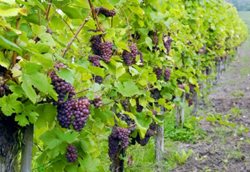
Winemakers face climate change with dread

"All over the world, alcohol levels are going up," said British wine critic Jancis Robinson at the WineFuture conference, citing just one problem producers are facing as a result of rising temperatures.
"Champagne alcohol levels are becoming embarrassingly high," she added, meaning that the heat which is raising the alcohol content changes both the texture and personality of a wine.
Robinson said there were some "benevolent effects" of climate change - the slight increases in temperature currently benefiting certain wine-producing regions like California or Germany, as well as more ominous global implications.
"Even in England, the grapes are ripening more," she said. "Someone even planted a vineyard in Norway. Can you believe that?"
Less benevolent effects, added Robinson, are being seen in warmer wine producing regions around the world such as Australia where water shortages are contributing to the demise of many wineries.
"Farmers in Spain don't have nearly enough water," she continued, "Spanish wine has always been pretty dry and concentrated, but the last few vintages have reached a crisis point."
In the short to medium term, however, what might drive producers to go green has nothing to do with conscience or desire to save the world. For many, it's about money and marketing.
"I want to find new markets, particularly for export. I want to be the first winemaker who eliminates direct CO2 emissions. Nobody does that," said Manuel Garcia of Rioja's Bodegas Regalia de Ollauri. "As a commercial argument, it's very important."
Potentially, there's also money to be saved by going green.
At Garcia's new vineyard, he installed a geothermal system that takes advantage of the constant temperature underground to cool his cellars in the summertime and heat them in the winter, a game changer for wineries whose power bills are often referred to as "astronomical."
"My summertime cooling no cuesta nada (doesn't cost anything)," he said, making a "0" in the air with his thumb and index finger. "We paid €250 000 to install the system, but we'll recuperate our investment in four or five years."
"You might not get vineyard owners to want to save the Earth, but they'll want to save money," concludes Garcia.
Winemakers are also being encouraged to rethink how they ship their wines and how they make their bottles.
At the WineFuture conference last week, speaker Nicola Jenkins, drinks category expert for the Britain-based environmental agency WRAP cited a Chilean winery which used a "lightweighting" process on its bottles, reducing their weight from 485g to 425g and encouraging others to ship overseas in bulk using giant vats known as 'flexitanks' - both processes that result in CO2 emissions reductions and shipping cost savings.
But it's still a slow process getting winemakers on board.
Source: AFP
Published courtesy of


















